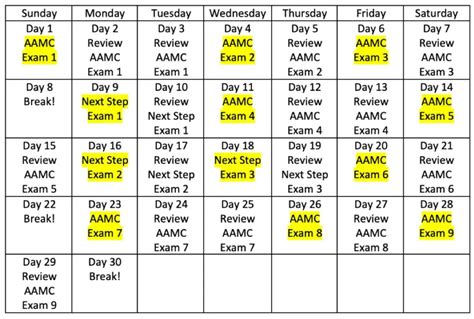Overview: A Month-Long Intensive Preparation Blueprint

The Medical College Admission Test (MCAT) is a pivotal milestone in the medical school application process, serving as a crucial indicator of your academic readiness and critical thinking abilities. With only one month remaining until test day, devising a strategic study plan becomes paramount. This 1-month MCAT study plan offers a comprehensive roadmap to optimize your preparation, maximizing your chances of achieving a competitive score.
Assessment and Time Management: Laying the Foundation
- Baseline Assessment: Begin by taking a full-length practice exam under timed conditions. This will provide a benchmark against which to measure your progress and identify areas for improvement.
- Time Management: Dedicate approximately 150-200 hours to studying over the next four weeks. Split this time wisely between content review, practice questions, and full-length exams.
content review: Mastering the Core Concepts
- Review Core Principles: Focus on reviewing the foundational concepts in biology, chemistry, physics, and social/behavioral sciences. Use official MCAT materials and reputable textbooks to solidify your understanding.
- Target Weaknesses: Analyze your practice exam results and pinpoint specific areas of weakness. Devote extra study time to these topics, using flashcards, concept maps, and online resources to enhance your comprehension.
- Active Recall: Utilize active recall techniques, such as self-quizzing and summary writing, to reinforce your learning and improve retention.
Practice, Practice, Practice: Honing Your Skills
- Practice Questions: Engage in extensive practice question solving. Utilize online question banks, MCAT prep books, and past exam papers to expose yourself to a wide range of question types and formats.
- Timed Sessions: Practice under timed conditions to simulate the actual exam experience. Focus on pacing yourself and optimizing your time management skills.
- Error Analysis: After each practice session, analyze your incorrect responses to identify patterns and address misconceptions.
Full-Length Exams: Simulating the Real Experience
- Take Full-Length Exams: Take full-length practice exams every 7-10 days to assess your overall progress and identify areas for further improvement.
- Time Management Techniques: Implement different time management strategies during practice exams, such as the Kaplan method or the Pomodoro technique, to determine the most effective approach for you.
- Exam Conditions: Create an exam-like environment while taking practice tests to replicate the actual test conditions and reduce test anxiety.
Mental Health and Wellness: Nurturing Your Well-being
- Prioritize Self-Care: Engage in regular exercise, maintain a healthy diet, and get adequate sleep to support your cognitive function and overall well-being.
- Manage Stress: Implement stress-management techniques such as yoga, mindfulness, or spending time in nature to combat the pressures of studying.
- Seek Support: Connect with peers, family members, or a therapist to provide emotional support and encourage you throughout the study process.
Tips and Tricks for Success
- Utilize Technology: Leverage online platforms, flashcards apps, and video tutorials to enhance your learning experience.
- Join Study Groups: Collaborate with peers to review material, discuss concepts, and exchange perspectives.
- Study Smart: Break down complex concepts into smaller, manageable units and focus on active learning techniques.
- Reward Yourself: Set milestones and reward yourself for achieving them to maintain motivation and avoid burnout.
- Pace Yourself: Establish a realistic study schedule and avoid cramming at the last minute.
Common Mistakes to Avoid
- Passive Learning: Avoid relying solely on passive reading or listening. Engage in active learning techniques to improve retention.
- Overstudying: While studying diligently is essential, avoid burnout by taking breaks and prioritizing quality over quantity.
- Procrastination: Start studying immediately and avoid putting things off until later.
- Ignoring Weaknesses: Focus on improving your weaknesses rather than solely revisiting areas of strength.
- Neglecting Practice Exams: Full-length practice exams are crucial for assessing progress and preparing for the actual exam.
Step-by-Step Approach
Week 1:
* Baseline assessment and time management planning
* Core principle review: biology and chemistry
Week 2:
* Core principle review: physics and social/behavioral sciences
* Practice question solving: biology and chemistry
Week 3:
* Practice question solving: physics and social/behavioral sciences
* Full-length practice exam 1
Week 4:
* Error analysis and targeted weakness improvement
* Practice question solving: full-range coverage
* Full-length practice exam 2
Additional Resources
- Official MCAT Website
- Association of American Medical Colleges (AAMC)
- Kaplan Test Prep
- Princeton Review
Conclusion
With a well-structured study plan and unwavering dedication, you can optimize your MCAT preparation within a 1-month timeframe. Remember to prioritize active learning, practice extensively, take full-length exams, and nurture your well-being throughout the process. By following the strategies outlined in this plan, you can enhance your confidence, improve your performance, and achieve your MCAT goals.
